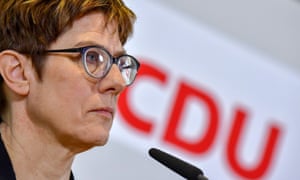Annegret Kramp-Karrenbauer also calls for party to reassess handling of 2015 refugee crisis

Annegret Kramp-Karrenbauer: ‘There is a growing impression that crusades are being led against diesel.’
Photograph: Tobias Schwarz/AFP/Getty Images
Angela Merkel’s replacement as leader of Germany’s Christian Democrats has criticised the country’s leading environmental organisations for leading “crusades” against diesel cars, as she attempts to put distance between herself and her predecessor.
In addition to her comments on diesel, Annegret Kramp-Karrenbauer this weekend called for the CDU to reexamine its handling of the 2015 refugee crisis, Merkel’s most divisive political decision.
“Our security agencies need to be more assertive, including in the overall area of migration,” she said.
Following a string of election setbacks for the party last autumn, Kramp-Karrenbauer – who has been called a “mini-Merkel” – promised to reinvigorate the CDU to bring back voters in this year’s elections for the European parliament and in three eastern German states.
Merkel, who has been critical of diesel bans, although less strongly, remains chancellor but has said she will stand down at the end of her term in 2021.
Kramp-Karrenbauer praised the non-governmental German Environment Aid (DUH), which has led the campaign for diesel bans in major German cities, but said: “There is a growing impression that crusades are being led against diesel.”
Kramp-Karrenbauer, who succeeded Merkel as head of the centre-right CDU last month, also told the broadcaster n-tv that people should not forget that “hundreds of thousands of jobs” in Germany depended on the car industry.
Regulation of diesel emissions has been a divisive topic in Germany since the 2015 ”dieselgate” scandal, when the German carmaker Volkswagen admitted to deceiving regulators about its vehicles’ emissions levels. Germany’s top administrative court ruled last year that cities could ban diesel cars to improve air quality. Several major cities, beginning with Hamburg last spring, have since implemented bans.
These crackdowns have created challenges for Germany’s automobile manufacturers, an industry that accounts for about 800,000 jobs in the country.
Cities’ diesel bans have encountered pushback both legally and politically, with opponents winning recent victories. Last month a court in the German state of Hesse halted a planned diesel ban in Frankfurt, pending an appeal. Days later, the German government paved the way for carmakers to replace filtering systems on old vehicles to keep them on the streets.
Kramp-Karrenbauer’s comments about DUH are a continuation of her party’s recent discussions on the issue: last month, CDU delegates voted in Hamburg for a proposal to cut federal funding for the organisation.
Over the weekend she told Welt am Sonntag that DUH’s status as a charitable organisation should be reviewed. “It’s not about drying anyone up financially,” she said. “It’s about dealing with them politically.”
DUH officials, meanwhile, have dismissed such criticisms from CDU leaders, saying the party is too cosy with the automotive industry. “Parts of the CDU have become the political arm of the corporations,” Jürgen Resch, the head of DUH, told the newspaper Handelsblatt last week.